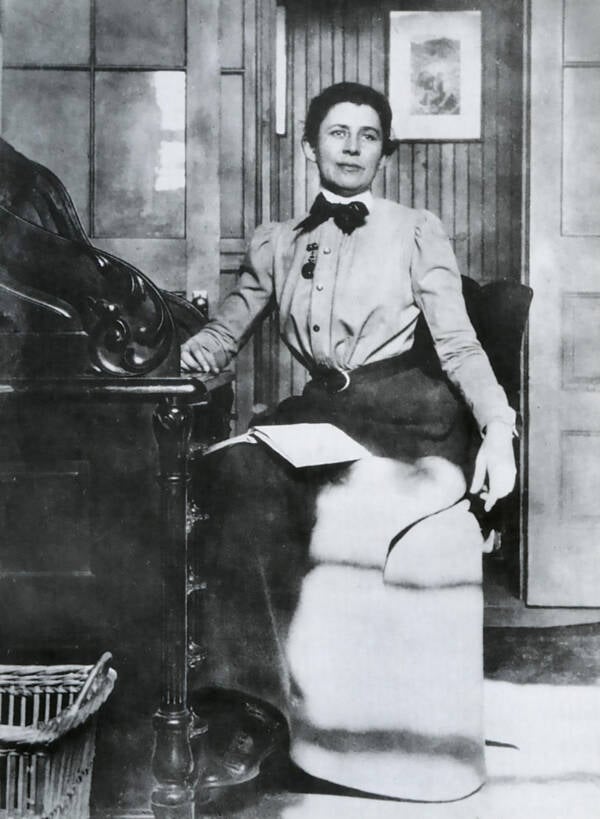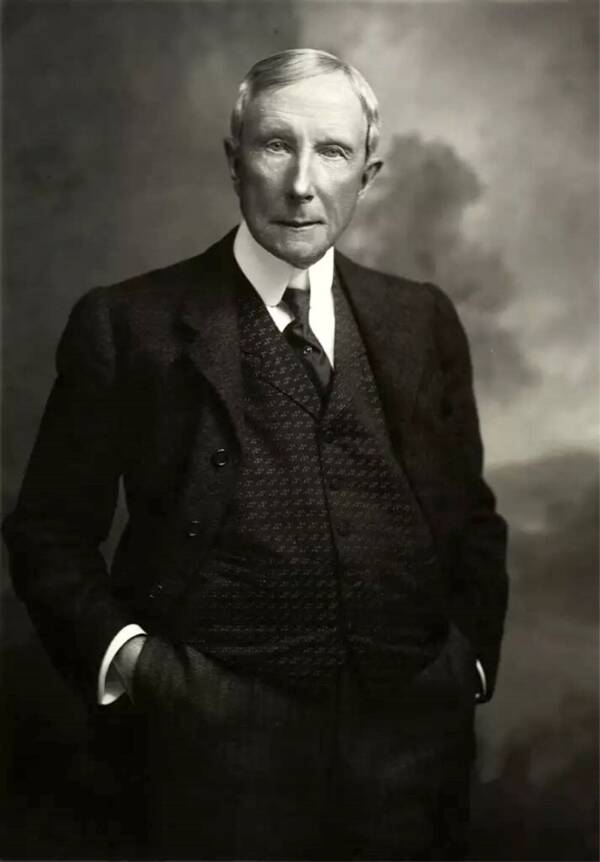Ida Tarbell's 19-part exposé on John D. Rockefeller’s Standard Oil helped lead to the break-up of the company, and established her as one of the most prominent muckraker journalists of her day.

Everett Collection Historical/Alamy Stock PhotoIda M. Tarbell, the muckraking journalist best known for her exposé of Standard Oil.
A Progressive-era journalist, Ida Tarbell changed history when she set her sights on John D. Rockefeller’s Standard Oil Company. Her exposé helped lead to break up his company, and established Tarbell as one of America’s great investigative journalists. But for her, it was personal.
Tarbell’s childhood in the oil fields of Pennsylvania gave her a close look at the seedy underbelly of the oil industry. As a girl, she saw how Rockefeller and Standard Oil gamed the system and hurt independent manufacturers.
And as an adult, Tarbell used her pen to fight back.
Her 19-part exposé of Standard Oil’s backroom tactics came out between 1902 and 1904 and explained the oil industry’s machinations in easy-to-understand terms. It placed Tarbell among the best-known muckrakers of her day, and helped lead to the breakup of Standard Oil in 1911.
The oilman’s daughter took on the oil industry — and won.
Ida Tarbell’s Early Experiences With The Oil Industry

Pictorial Press Ltd/Alamy Stock PhotoIda Tarbell at her writing desk.
Ida Minerva Tarbell was born on Nov. 5, 1857 in Hatch Hollow, Pennsylvania. Her mother was a teacher while her father was an oilman.
At a young age, Tarbell witnessed the power of John D. Rockefeller through her father’s experiences with Standard Oil. Though the Pennsylvania Oil Rush of 1859 had vastly improved her family’s prospects, things changed dramatically when Rockefeller arrived on the scene.
Then, Rockefeller launched a plan to control oil and gas production in the region by striking a deal with major railroads to raise their shipping fees and pay “rebates” and “drawbacks” to him. The so-called 1872 South Improvement scheme infuriated oilmen like Tarbell’s father, but there was little anyone could do in the face of Rockefeller’s immense power.
“[S]uddenly [our] gay, prosperous town received a blow between the eyes,” Tarbell later wrote of Rockefeller’s scheme. “Out of the alarm and bitterness and confusion, I gathered from my father’s talk a conviction to which I still hold — that what had been undertaken was wrong.”
Ida Tarbell carried this seed of injustice all her life. It’s no wonder that she later sought to expose the unfair working practices of Standard Oil.
How Ida Tarbell Sets Her Sights On Standard Oil
After graduating from Allegheny College in 1883, Ida Tarbell briefly taught in Ohio before finding work back in Pennsylvania at a magazine called The Chautauquan. She worked there until 1891, then decided to move to Paris in order to write a biography about Madame Roland, a woman who ran an influential salon during the French Revolution, according to PBS.
In Paris, Tarbell supported herself by writing for magazines including McClure’s, a 20th-century illustrated American periodical. Her multiple part series on Abraham Lincoln and Napoleon Bonaparte proved immensely popular, and doubled McClure’s circulation.
Having established herself as a popular magazine writer, Ida Tarbell set her sights on the enemy of her youth: John D. Rockefeller and Standard Oil.

Public DomainJohn D. Rockefeller Sr. controlled 90 percent of American oil at his most powerful, and was worth hundreds of millions of dollars.
McClure’s agreed to publish a three-part series on Standard Oil, and Tarbell quickly got to work. According to PBS, she studied court testimonies, state and federal reports, and newspaper coverage, to explain, in simple, easy-to-understand terms, Standard Oil’s unethical behavior.
Her series proved so popular that it was expanded to a 19-part series, which Tarbell ended with a scathing character study of Rockefeller himself.
“It takes time to crush men who are pursuing legitimate trade,” Tarbell wrote. “But one of Mr. Rockefeller’s most impressive characteristics is patience… He was like a general who, besieging a city surrounded by fortified hills, views from a balloon the whole great field, and sees how, this point taken, that must fall; this hill reached, that fort is commanded. And nothing was too small: the corner grocery in Browntown, the humble refining still on Oil Creek, the shortest private pipe line. Nothing, for little things grow.”
Of Rockefeller, Tarbell added: “Our national life is on every side distinctly poorer, uglier, meaner, for the kind of influence he exercises.”
The magazine series — published between 1902 and 1904 — was later turned into a book, The History of the Standard Oil Company. It made Tarbell one of the best known investigative journalists of her day, who were dubbed “muckrakers” by President Theodore Roosevelt.
And it certainly caught the attention of Rockefeller. He referred to Ida Tarbell as “that poisonous woman” but forbid anyone from commenting on her accusations. “Not a word,” Rockefeller instructed his advisors. “Not a word about that misguided woman.”
In the end, Ida Tarbell would have the last word.
Ida Tarbell’s Life Following The Exposé Of Standard Oil Company
Because of Ida Tarbell’s investigative journalism, Standard Oil faced new scrutiny. In 1911, the U.S. Supreme Court ruled that the company was violating the Sherman Antitrust Act, which banned monopolies. Because of this ruling, the Supreme Court ordered Standard Oil Company to be broken up into 34 companies.
Today, these smaller companies include ExxonMobil and Chevron.
Importantly, Tarbell’s Standard Oil exposé also solidified a heightened consciousness of the enormity and influence of certain companies among the American public. Her work, alongside work by other muckraker journalists like Lincoln Steffens and Upton Sinclair, pioneered the Progressive Era.
And Tarbell didn’t rest on her laurels. She wrote for several magazines, produced books about Abraham Lincoln, and got involved in politics. Tarbell also roused the ire of female suffragettes because she, despite her own trajectory, argued for women to maintain their traditional role in the home.
By the time she died in 1944, at the age of 86, Ida Tarbell had written countless pages on everything from American presidents to French revolutionaries. But she’s best known for her meticulous research into Standard Oil, and her argument that the company — and Rockefeller — were in the wrong. As Ida Tarbell explained:
“They had never played fair, and that ruined their greatness for me.”
After reading about Ida Tarbell, discover the story of Nellie Bly, a young reporter who faked her way into a mental asylum and exposed its dark secrets. Then, dive into the horrifying story of the radium girls, women who were exposed to lethal amounts of radium while working at a watch factory.





